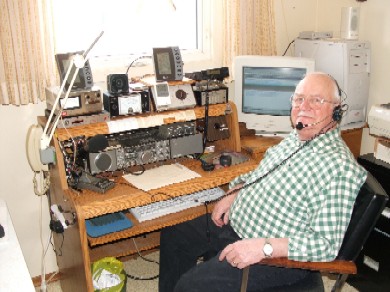|

Paul Obetkoff, a Kamsack native who returned to his home community
in (1999) six years ago, after having retired from a career
as a co-op manager, has been an amateur radio operator since
acquiring his first license in 1972.
A member of the Amateur Radio Emergency Service (ARES), Obetkoff
is the service's Saskatchewan emergency coordinator and is a
member of the Canora Amateur Radio Club, which is obtaining
funds from district communities to allow its members to swing
into action, if and when the
need arises.
At its regular meeting last week, town council, accepting a
recommendation of its Emergency Measures Organization, approved
a donation of $100.00 to the club.
The funds from Kamsack and other communities will allow the
club to be in a position, so that members, in an emergency will
be able to provide communication for fire, ambulance, police
and rescue personnel.
Discussing his hobby on Tuesday while sitting at his desk in
a room especially devoted to amateur radio in his
Decorby
Street
home, Obetkoff provides an overview of what can be and has been
done with equipment such as his.
Using equipment valued at $5,000.00 to $6,000.00, Obetkoff explains
how he maintains communications with other amateur radio operators
and volunteers to be a resource for such organizations as Environment
Canada, which during times of inclement weather, relies on amateur
radio operators to provide and disseminate information.
He is able to recount several incidents in the past 30 years,
in which amateur radio operators were indispensable in emergency
situations.
Obetkoff explains how, if needed, his equipment can be taken
from his home to his vehicle and out to the field, to provide
communication service.
In addition to promoting amateur radio in the district, Obetkoff
and the Canora club raise the funds for new equipment and for
upgrades to existing equipment; aim to raise awareness of amateur
radio emergency services; communicate with emergency measures
personnel for improvement towards a more reliable communication
system, and encourage other persons interested in becoming amateur
radio operators.
A trained group of amateur radio operators willing to assist
emergency services and municipal agencies, ARES members are
specialists in various forms of communication modes from,
computerized packet radio, long distance high frequency
voice and Morse code, UHF and VHF voice and even amateur
television, the club's letter to town council said. To
be an amateur radio operator, Industry
Canada
requires that individuals pass examinations in technical and
regulatory competence.
Club members come from various walks of life including
police, fire, and ambulance services, doctors, nurses,
lawyers, radio and computer technicians and former military
officers, it said. "In, exercise situations, we find ourselves being radio resource
persons for officials in command post and control group locations."
Communications are often cited as the weakest link in the command
and control component of an emergency, it said. In emergency
situations, traditional systems become overloaded or are disabled,
and groups who normally don't need radio communications, such
as social services, need it.
|